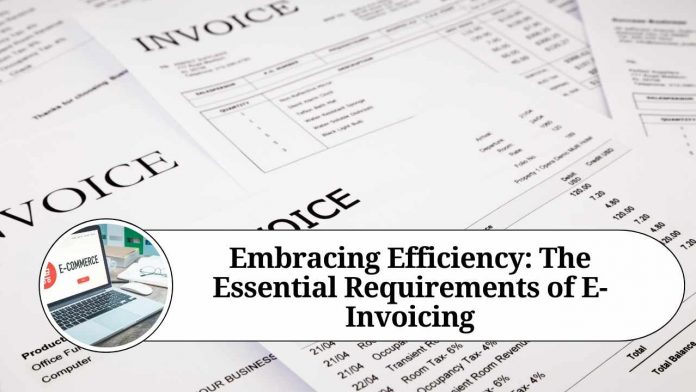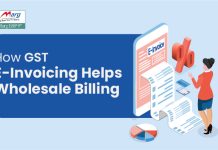Introduction
In today’s rapidly evolving digital landscape, businesses are continuously seeking innovative solutions to streamline their operations and enhance efficiency. One area that has witnessed remarkable advancements is invoicing. Traditional paper-based invoicing processes are gradually being replaced by electronic invoicing, or e-invoicing, which offers numerous benefits, including reduced costs, improved accuracy, and enhanced productivity. However, to fully leverage the advantages of e-invoicing, it is crucial for businesses to understand the essential requirements involved. In this blog, we will explore the key elements that businesses must consider to successfully implement e-invoicing.
- Legal and Regulatory Compliance: One of the primary considerations when adopting e-invoicing is ensuring compliance with the legal and regulatory requirements in your jurisdiction. Different countries may have specific regulations governing e-invoicing, including invoicing formats, data retention periods, digital signatures, and authentication methods. Familiarize yourself with the legal framework and seek guidance from experts or legal professionals to ensure compliance with all relevant laws and regulations.
- Standardized Invoice Formats: To facilitate seamless communication between trading partners and enable automation, standardized invoice formats play a vital role. Industry-standard formats such as UBL (Universal Business Language) and XML (eXtensible Markup Language) are commonly used for e-invoicing. These formats provide a structured way of presenting invoice data, ensuring consistency and compatibility across different systems. Adhering to standardized formats allows for easy integration with accounting software, minimizing manual intervention and reducing errors.
- Data Accuracy and Integrity: Maintaining data accuracy and integrity is crucial for the success of e-invoicing. Implementing robust data validation mechanisms ensures that invoices contain accurate and complete information, minimizing discrepancies and disputes. Additionally, employing digital signatures or other authentication methods helps guarantee the authenticity and integrity of the invoices, safeguarding against fraud and tampering.
- Interoperability and Integration: Seamless integration of e-invoicing systems with existing business processes is essential for maximizing efficiency. Businesses should choose e-invoicing solutions that support interoperability, enabling smooth communication and exchange of invoices between different systems and platforms. Integration with enterprise resource planning (ERP) systems, accounting software, and payment gateways streamlines the entire invoicing cycle, from invoice creation to payment settlement, reducing manual effort and enhancing automation.
- Data Storage and Retention: While e-invoicing eliminates the need for physical storage, businesses must ensure proper digital storage and retention of invoices. Compliance with data protection and privacy regulations, such as the General Data Protection Regulation (GDPR), is crucial. Implement secure cloud-based storage or on-premises solutions to store invoices and associated data, ensuring accessibility, security, and adherence to retention periods mandated by local regulations.
- Supplier and Customer Onboarding: For successful implementation, it is essential to onboard both suppliers and customers onto the e-invoicing platform. Educate suppliers about the benefits of e-invoicing and provide necessary training and support to facilitate their transition. Similarly, engage with customers to promote e-invoicing and ensure their readiness to receive and process electronic invoices. Collaborate with trading partners to establish clear communication channels and streamline the invoicing process.
Conclusion
E-invoicing offers significant advantages to businesses, such as cost reduction, increased accuracy, and streamlined operations. However, embracing e-invoicing requires careful attention to the essential requirements outlined in this blog. By ensuring legal and regulatory compliance, adopting standardized invoice formats, maintaining data accuracy and integrity, enabling interoperability and integration, implementing robust data storage practices, and effectively onboarding trading partners, businesses can unlock the full potential of e-invoicing.
Read more useful content:
Frequently Asked Questions (FAQs)
Q. What is e-invoicing?
E-invoicing refers to the electronic exchange of invoices between businesses and their trading partners. It involves the creation, transmission, and receipt of invoices in digital format, eliminating the need for paper-based invoices.
Q. Why should businesses consider adopting e-invoicing?
Adopting e-invoicing offers several benefits, including cost reduction, improved accuracy, faster processing times, enhanced productivity, reduced environmental impact, and better visibility into financial transactions.
Q. Are there any legal requirements for e-invoicing?
Yes, there are often legal requirements and regulations governing e-invoicing in different jurisdictions. These requirements may include invoicing formats, data retention periods, digital signatures, and authentication methods. It’s crucial to familiarize yourself with the legal framework in your country to ensure compliance.
Q. What are standardized invoice formats, and why are they important?
Standardized invoice formats, such as UBL (Universal Business Language) and XML (eXtensible Markup Language), provide a structured way of presenting invoice data. They ensure consistency and compatibility across different systems, facilitating seamless communication between trading partners and enabling automation.
Q. How can businesses ensure data accuracy and integrity in e-invoicing?
Maintaining data accuracy and integrity is essential. Implementing robust data validation mechanisms helps ensure that invoices contain accurate and complete information, minimizing discrepancies and disputes. Employing digital signatures or other authentication methods ensures the authenticity and integrity of invoices, protecting against fraud and tampering.
Q. How can businesses integrate e-invoicing with their existing systems?
Seamless integration of e-invoicing systems with existing business processes is crucial for efficiency. Choose e-invoicing solutions that support interoperability, allowing for smooth communication and exchange of invoices between different systems and platforms. Integration with ERP systems, accounting software, and payment gateways streamlines the entire invoicing cycle, reducing manual effort and enhancing automation.
Q. How should businesses store and retain e-invoices?
While e-invoicing eliminates the need for physical storage, it’s important to ensure proper digital storage and retention of invoices. Compliance with data protection and privacy regulations, such as GDPR, is crucial. Implement secure cloud-based storage or on-premises solutions to store invoices and associated data, ensuring accessibility, security, and adherence to retention periods mandated by local regulations.
Q. How can businesses onboard their suppliers and customers onto e-invoicing?
Successful implementation requires onboarding both suppliers and customers onto the e-invoicing platform. Educate suppliers about the benefits of e-invoicing and provide necessary training and support for their transition. Similarly, engage with customers to promote e-invoicing and ensure their readiness to receive and process electronic invoices. Collaboration with trading partners establishes clear communication channels and streamlines the invoicing process.




















